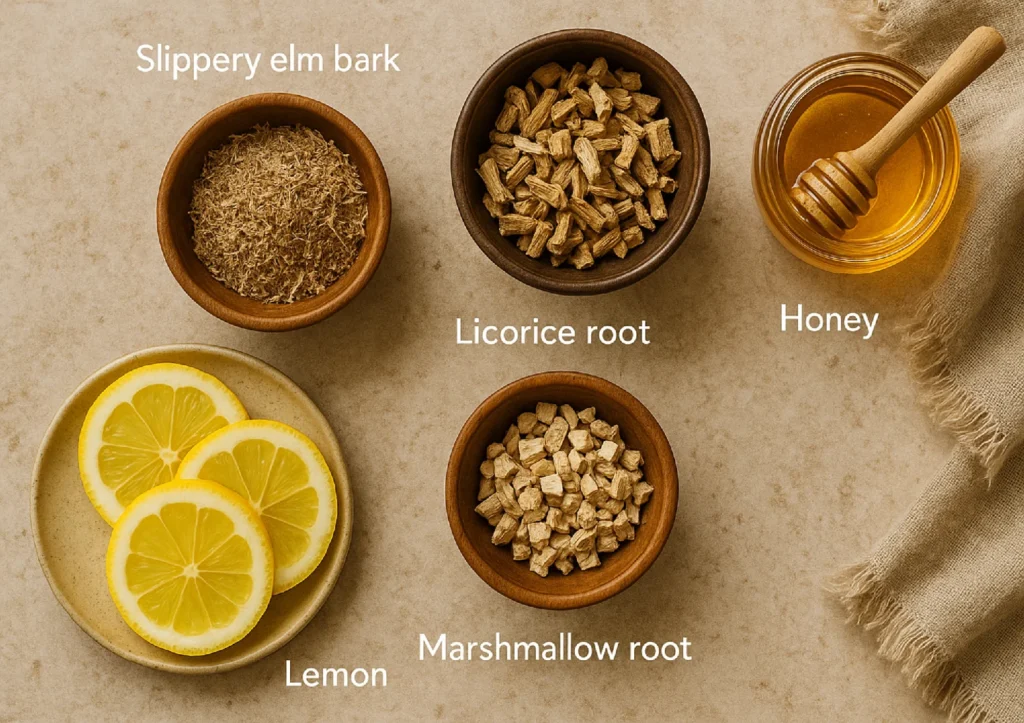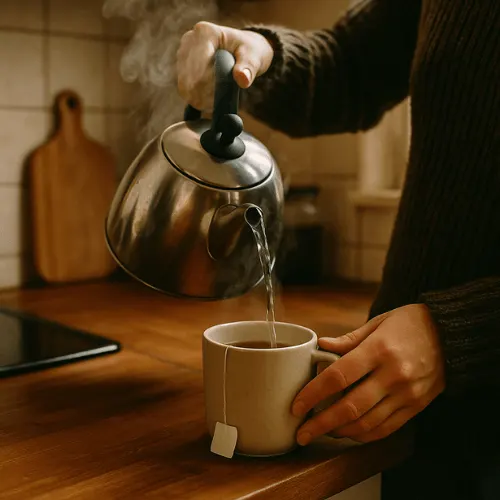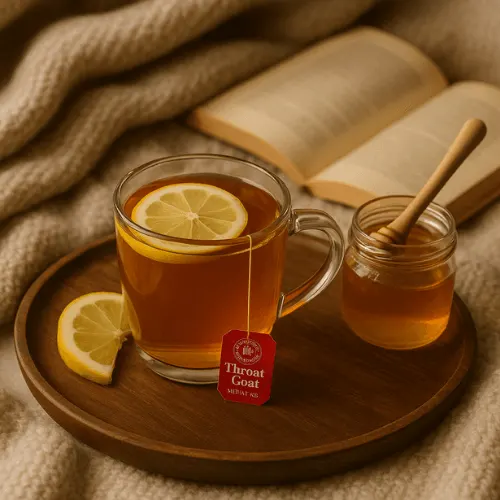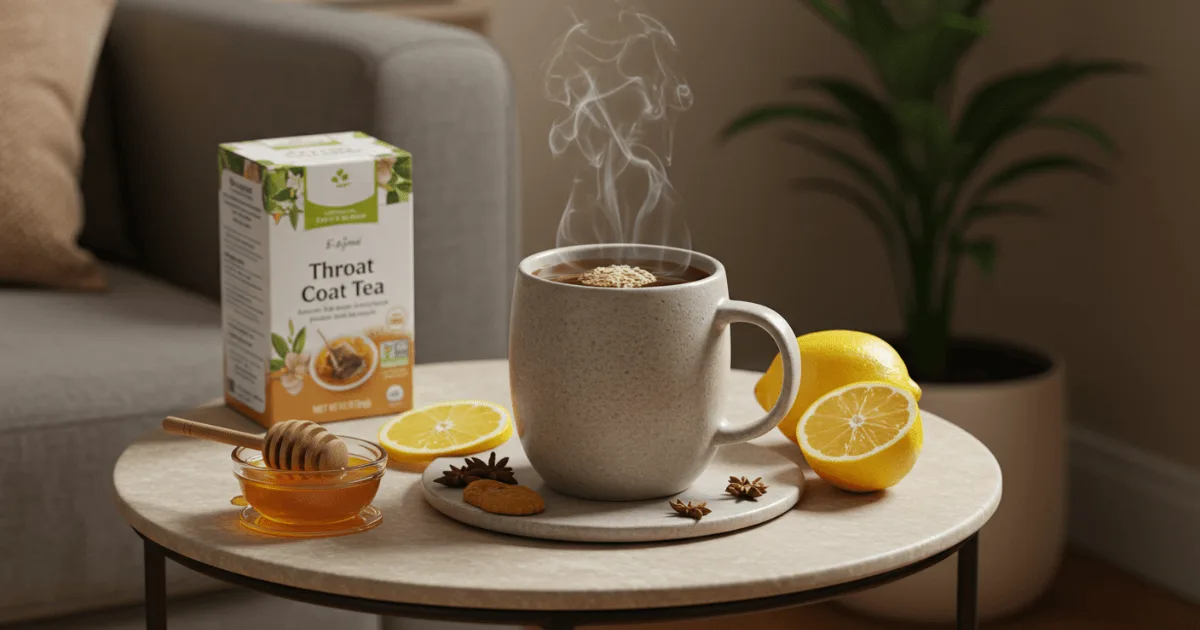You know that annoying, dry, sandpaper-y feeling in your throat that shows up at the worst possible time? Whether you’re prepping for a big performance, talking all day, or just caught a seasonal bug, Throat Coat tea is like a warm hug for your throat. Seriously—this stuff is magic in a mug.
And the best part? You can make it in under five minutes (not counting the steeping, but that’s just tea doing its thing while you chill).
So if you’re tired of sounding like a frog or just want to pamper your vocal cords, let me show you how to make the perfect cup.
Table of Contents
So… What Is Throat Coat Tea?
It’s not your usual breakfast brew. This one’s all about herbs, not caffeine. It’s made with something called demulcents, which is just a fancy word for herbs that create a soothing, jelly-like coating on your throat. Think of it as plant-powered TLC.
Once the herbs hit hot water, they release all their gooey goodness and make your throat feel instantly better. It doesn’t coat your vocal cords (anatomy doesn’t work that way!), but it feels like it does. And that’s the relief we’re after.
What’s in This Magical Brew?
Introducing the herbal blend that forms the backbone of Throat Coat tea:
- Slippery Elm Bark: This is the MVP. When it mixes with water, it turns into a thick, soothing gel that wraps your throat in comfort. Native Americans were onto something big here.
- Licorice Root: Adds sweetness and brings serious healing vibes. It’s great for respiratory health, and yes, it tastes a little like black licorice—so heads up if that’s not your thing.
- Marshmallow Root: Nope, not the puffy sugar ones. For ages, this root has been employed to alleviate throat discomfort because of its silky, mucilage-like consistency.
Together, they’re like the Avengers of sore throat relief.

Does It Actually “Coat” Your Vocal Cords?
Short answer? Nah, it doesn’t get that far. Your vocal cords are securely located in your larynx, and when you swallow, tea travels down your esophagus instead of your trachea.
BUT, it coats your throat—the part that gets dry, sore, and cranky. That’s where the soothing magic happens. Plus:
- Warm tea relaxes throat muscles.
- The herbs fight inflammation.
- It keeps you hydrated (way better than coffee when you’re under the weather).
Why It’s Not Just Hype: Real Benefits
There’s actual science behind the warm-fuzzy feelings you get from Throat Coat tea. People have done studies and everything. Here’s what it helps with:
- Fast relief from that scratchy, painful feeling
- Reduces inflammation so your throat isn’t red and angry
- Locks in moisture so your throat doesn’t dry out again in 10 minutes
- Relaxes your muscles, which feels amazing if you’ve been yelling, singing, or talking all day
- Respiratory support (especially if you go for the eucalyptus version)
Who Needs This Tea in Their Life?
Honestly? Just about everyone at some point. But especially:
- Singers, teachers, speakers, and podcasters who live on their voice
- Anyone fighting off a cold or post-flu recovery
- Folks with allergies or those constantly exposed to dry air
- Daily tea lovers who want something cozy and functional
Okay, Let’s Brew This Thing
Making it is so easy, and you only need a few basics.
What You’ll Need:
| Ingredient | Amount | Why It Matters |
|---|---|---|
| Throat Coat Tea Bag | 1 | Choose your fave: Original, Lemon Echinacea, or Eucalyptus |
| Hot Water | 8 oz | Filtered = better taste |
| Honey (optional) | 1–2 tsp | Sweet and soothing |
| Lemon (optional) | 1–2 slices | Adds vitamin C + brightness |
How to Make It:
- Boil Your Water (Takes 2 mins)
Bring 8 oz of water to a full rolling boil—not just warm. This helps the herbs work their magic. - Steep Like a Pro (10–15 mins)
Put the tea bag in a cup and pour the boiling water over it. Then, cover the cup with a small plate (yes, really). This traps the good stuff—steam and essential oils. Let it steep for 10–15 minutes. Yes, it’s longer than your usual tea. No, you shouldn’t skip it. - Sip & Enjoy (1 min to dress it up)
Give the tea bag a gentle squeeze (don’t burn yourself). Add honey or lemon if you’re feeling fancy or want extra throat-soothing powers.
Don’t rush the steeping. This is where the real throat-coating action happens. Let it do its thing.


What Does It Taste Like?
Throat Coat tea is kinda like herbal candy… if herbal candy was good for your throat.
- Original: Licorice-forward, sweet, and smooth. Almost creamy.
- Lemon Echinacea: A vibrant citrus flavor with a touch of earthy zest.
- Eucalyptus: Cool, minty, and extra refreshing.
Not into licorice? Try it with honey. It grows on you, especially when you feel how fast it helps.
A Few Warnings (Better Safe Than Sorry)
This tea is herbal, but that doesn’t mean it’s 100% risk-free for everyone. Here’s what to keep in mind:
- Blood Pressure: Licorice root can mess with blood pressure. Talk to your doctor if you have hypertension or take related meds.
- Not for Kids: Most versions are meant for adults. Ask your pediatrician before giving it to little ones.
- Pregnant or Nursing? Double-check with your doctor first.
- Taking Meds? Throat Coat tea can interact with blood pressure meds, blood thinners, diabetes meds, or anything metabolized by the liver. Just give your doc a heads-up.
How Does It Compare to Other Remedies?
| Remedy | Pros | Cons |
|---|---|---|
| Honey | Natural, soothing, antimicrobial | Can’t coat like the herbs do |
| Salt Water Gargle | Easy, kills bacteria | Short-term relief only |
| Throat Lozenges | Convenient on the go | Often artificial and just numb things |
| Throat Coat Tea | Natural, lasting, comforting | Takes a little prep time |
Best combo? Tea + honey = throat relief power duo.
Pro Tips for Serious Relief
- Double Bag It: Extra sore? Brew two bags for a stronger cup.
- Try Manuka Honey: Super soothing and antimicrobial.
- Sip All Day: Morning, pre-performance, post-performance, before bed—it all helps.
- Stay Hydrated: Alternate with plain water to keep your voice happy.
When You Should Call a Doctor
Tea can’t fix everything. If you’ve got:
- A sore throat that lingers for over a week
- Trouble swallowing or breathing
- Fever or white patches in your throat
- Recurring throat pain
…it’s time to see a pro.
Singers and voice users: if throat issues keep popping up, consider chatting with a voice therapist or ENT specialist.
Final Thoughts
Throat Coat tea is the real deal—simple, soothing, and made with herbs that have your back (or, well, your throat). Whether you’re under the weather, belting out tunes, or just want a cozy tea that does something, this one’s a game-changer.
Boil. Steep. Sip. Relax.
Once you try it, you’ll probably start reaching for it the second your throat even thinks about getting sore.
Throat Coat Tea FAQs
How long should I let Throat Coat tea steep?
For the best results, let your tea steep covered for 10-15 minutes. This gives the herbs (especially the slippery, soothing ones) enough time to release all their good stuff into your cup.
Can I have this tea on a daily basis?
If you’re truly feeling sick, having 4-6 cups per day is alright. But for everyday use, you might want to check with your doctor first—licorice root in there can affect your blood pressure if you overdo it long-term.
Can pregnant women drink Throat Coat tea?
Because it contains licorice root, moms-to-be and breastfeeding women should definitely talk to their healthcare provider before making this tea a regular habit.
Do singers use this stuff?
You bet! While the tea doesn’t reach your vocal cords directly, plenty of pro singers swear by it. It keeps your throat hydrated, helps relax tight muscles, and soothes irritated tissue—all things that help keep your voice in top shape.
Is this tea safe for kids?
The standard blend is made with adults in mind. If your little one has a sore throat, your pediatrician can suggest something more suitable for children.
When’s the best time to drink it?
If your throat’s bothering you, sip it whenever you need relief. For voice care, try drinking a cup about 30–60 minutes before you need to sing or speak, and another right after to help your throat recover.
What’s the deal with organic Throat Coat tea?
Herbs in the organic version are grown without synthetic pesticides or fertilizers. You’re getting the same throat-soothing benefits, just without the extra chemicals.


bookmarked!!, I like your site!
Love that this throat coat tea can be made so quickly—perfect for when I’m feeling under the weather! 🍵
I tried it, but it didn’t really help my throat much—still nice though.
This is exactly what I need when my throat feels irritated. I love how quick and simple it is!
Thank you! Sometimes the simplest remedies are the best. I’m glad you found it useful—hope it brings you quick comfort
Great recipe! I’ve used the store-bought version before but wanted to try making it myself. I followed your tip about the water temperature and covering the mug, and the tea came out incredibly smooth and effective. My scratchy throat felt better almost immediately. Thank you for the clear instructions!
You’re so welcome! I’m thrilled to hear it brought you quick relief. That combination of the right temperature and covering it really does unlock the full soothing power of the herbs. Thank you for taking the time to try it and share your experience!
Love this quick throat coat recipe! Does it work as well as the store-bought stuff?
It totally rivals Traditional Medicinals—slippery elm and licorice root coat your throat just right, easing that scratchy feeling in minutes! Boil water, steep for 4 mins with a honey drizzle, and sip warm. Perfect for singers or cold season. What’s your sore throat go-to?
Thanks for the recipe! I’ve been buying the branded tea bags for years and never realized how simple it is to make my own blend. The tip about covering the mug is a game-changer—the flavor is so much stronger! I added a little licorice root for sweetness, and it worked perfectly.
So glad you tried it and found the covering trick useful! It really does make a difference. Adding licorice root is a fantastic idea—it’s another classic soothing herb that complements the others beautifully. Enjoy your custom, super-powered throat tea!
I love quick remedies like this! Five minutes is perfect for a busy day.
Honestly, I didn’t feel much difference compared to regular tea.
This sounds amazing! I always struggle to find tea that actually soothes my throat.
Totally agree! I tried it last week, and it really did help instantly.
Wow, I didn’t know you could make throat-soothing tea that fast! I’ll have to try this tonight.
Yeah, it’s quick, but I’m not sure it’s any better than just hot water with honey.
Nice! Quick teas are always a lifesaver when you’re busy. ☕
Hmm, I tried it and it didn’t taste as good as the longer-steeped version.
This sounds perfect for when my throat is sore! 😌
Absolutely! I tried it, and it really helps soothe your throat fast.
Wow, I didn’t realize you could make Throat Coat Tea so quickly!
I guess it’s convenient, but I usually prefer letting it steep longer for more flavor.